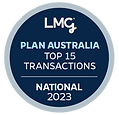9 Essential Steps to Buying Your First Home in Australia
Buying your first home is one of the biggest financial decisions you’ll ever make. To help first home buyers feel confident and prepared, we’ve created a simple, step-by-step guide covering everything from home loan pre-approval to settlement day.
5.0 ( 400+ Google Reviews )
First Home Buyer Guide
1. Get Your Home Loan Pre-Approval
The first step for any first home buyer is understanding your borrowing capacity and securing home loan pre-approval. Speak with a mortgage broker to help you compare lenders, explain variable vs fixed rates, and ensure you’re eligible for first home buyer schemes and stamp duty concessions. Pre-approval shows sellers you’re a serious buyer and helps you avoid finance delays later.
2. Start Your Property Search
Begin browsing on Domain or Realestate.com.au to compare sale prices, research suburbs, and shortlist properties. First home buyers often start with a dream suburb — but if prices are too high, consider neighbouring areas to find better value. Use filters to refine your search by price, property type, land size, school zones, and commute times.
3. Attend Property Inspections (First Home Buyer Checklist)
Inspections are essential when buying your first home. Use the inspection planner on real estate apps to track open homes without rushing. When inspecting a property, check:
-
Overall condition
-
Layout and natural light
-
water damage or cracks
-
surrounding noise levels
-
local amenities (schools, shops, transport, childcare, parks)
Taking your time will help you avoid costly surprises later.
4. Request the Contract of Sale
When you find a property you like, request the Contract of Sale and send it to your conveyancer or solicitor for review. This is especially important for first home buyers, as the contract outlines key details such as inclusions, settlement terms, and special conditions. Only request contract reviews for homes you are seriously considering to avoid unnecessary fees.
5. Order Building, Pest or Strata Reports
Before buying, it’s essential to check the property’s condition.
For houses: organise a building and pest inspection (from $500)
For units/apartments: request a strata report (around $300), which outlines levies, maintenance, insurance and upcoming works
Also check insurance quotes to see if the property is in a flood zone or bushfire-prone area — a common concern for first home buyers.
6. Research Market Value Before Making an Offer
Before making an offer, research recent sale prices for similar homes in the area. We can provide RP Data property reports, suburb trends, and market insights to help first home buyers understand whether a property is priced realistically. This step helps prevent overpaying and boosts confidence during negotiations.
\
7. Understand Private Treaty vs Auction
Many first home buyers are unsure whether to buy via private treaty or auction.
Private Treaty Sale:
-
You make an offer and negotiate
-
Often includes a cooling-off period
-
Allows time for valuation and formal loan approval (varies by state)
Auction:
-
No cooling-off period
-
A 10% deposit is required immediately if you win.
-
You must have home loan pre-approval and a clear budget before bidding
Your mortgage broker can help you prepare by estimating your maximum bidding limit.
8. Contract Exchange & Paying the Deposit
Once both parties sign, the contract is exchanged, making it legally binding. You’ll pay your agreed deposit, which stays in the agent’s trust account until settlement. Send the signed contract to your mortgage broker and conveyancer so they can organise loan documents, valuation, and settlement preparation.
9. Settlement – Becoming a Homeowner
Settlement is the final step where you pay the balance of the purchase and officially become the legal owner of your first home.
Your conveyancer and mortgage broker will coordinate the transfer of funds, settlement booking, and loan drawdown. Once settlement is complete, you’ll receive the keys to your new home — congratulations!

Need More Information?
Talk to Our Home Loan
Experts Today.

More Resources for First Home Buyers

We're Here To Support You Through The Entire Home Buying Journey.
Make an Enquiry
Send us an enquiry or call 1300 103 998. Our team will get back to you within 30 minutes during business hours — and our service is completely free.
Get a Pre-approval
We’ll review your situation, help you understand your borrowing power, and organise your home loan pre-approval. We’ll also check your eligibility for Australian Government first home buyer grants to help you get into the property market sooner.
House Hunt
Once you're pre-approved, you can confidently start house hunting. We can also introduce you to trusted conveyancers and buyers agents to help guide you through every stage of your home-buying journey.
Settlement
Once you sign the contract, our team will manage the loan settlement with the bank, ensuring a smooth transition to becoming a homeowner. Our service doesn’t stop here — we’ll check in with you every six months to make sure everything is going smoothly.
.png)







.png)
